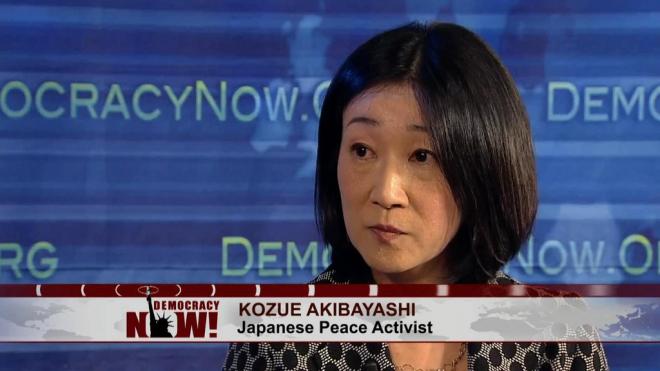California welcomes Kozue Akibayashi
Published on September, 41 2016
Kozue Akibayashi in 2015 interview with Amy Goodman, Democracy Now. Credit: Democracy Now.
On Wednesday, September 28, 2016, at noon, the Santa Cruz Branch will host Kozue Akibayashi for lunch, and that evening she will speak at the Peace and Justice Center in downtown San Jose. Other Central Coast Branches have been invited to join us. Please RSVP to Randa Solick (rsolick@gmail.com) of the Santa Cruz Branch if you plan to attend either event. Randa organized this regional visit and will host Kozue at her home.
Kozue is truly an international presence, and we’re thrilled to have her visit. We can find out about her own activism, and also about what is going on with WILPF in the UN and the world: WILPF has energetic and committed women—both young and older—in sections all over the globe—Africa, Europe, Southeast Asia, South America, and more. Kozue can fill us in on what they’re doing, and how to connect with them. She may also include in her talk comments on the nuclear disaster at Fukushima. Please join us for one or both of these events. Kozue will be flying home to Japan the following day.
Kozue Akibayashi is the current president of WILPF International. She is a professor at Doshisha University, Graduate School of Global Studies, in Kyoto, Japan. Kozue arrives in our area on September 27 for a two-day stay, coming here directly after attending the World Beyond War conference in Washington, DC.
In April 2015 Kozue was featured on Democracy Now, where she examined Japan’s growing military role, and discussed opposition to the presence of some 25,000 US military personnel stationed in Okinawa. On May 24, 2015, the International Women’s Day for Peace and Disarmament, Kozue joined other feminist peace activists, including Gloria Steinem of the United States, two Nobel Peace Laureates—Mairead Maguire of Northern Ireland and Leymah Gbowee of Liberia—and other women from 15 countries who crossed the Demilitarized Zone, which serves as a buffer between North Korea and South Korea, and made a powerful call for peace in the Korean Peninsula.
She writes, “My research/activism theme has been on the issues of militarism, militarization and demilitarization, and decolonization, analyzing them from a gender perspective.”



